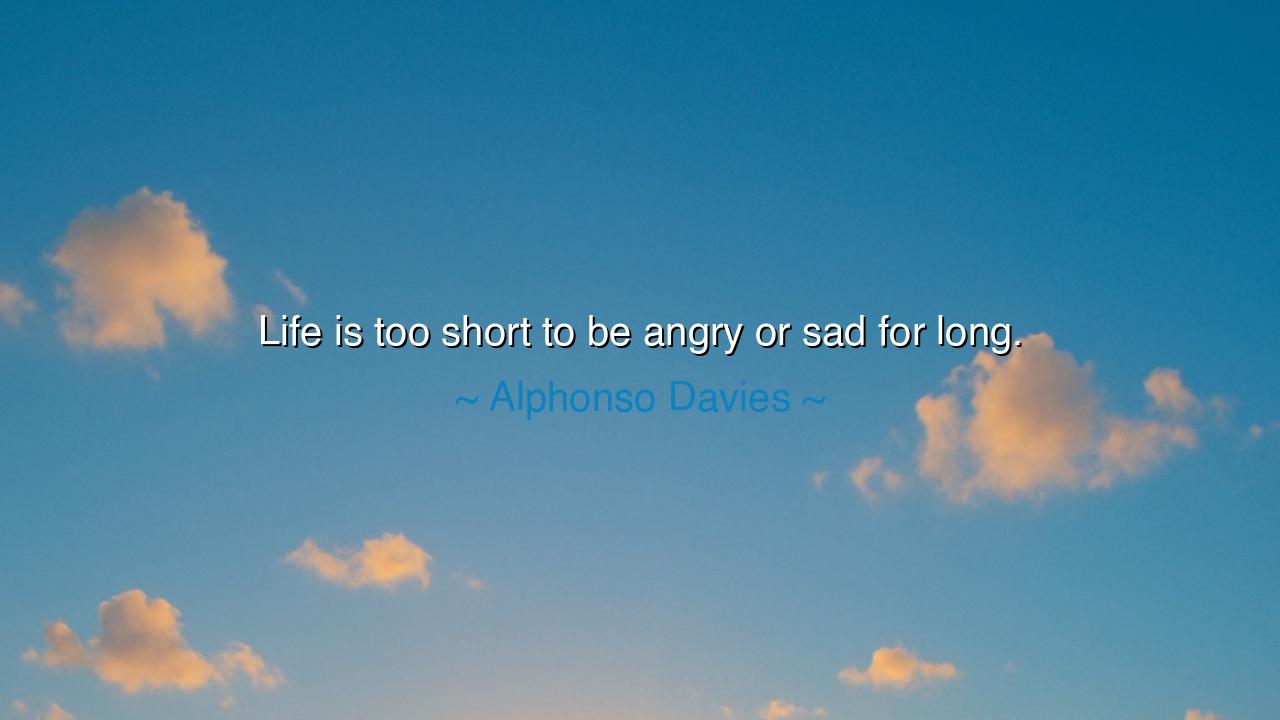
Life is too short to be angry or sad for long.






The words of Alphonso Davies, “Life is too short to be angry or sad for long,” are simple, yet they carry the weight of hard-earned wisdom. Spoken by a young man who rose from the harshness of a refugee camp to the grand stages of world football, these words are not merely advice—they are testimony. Behind their calm tone lies the echo of one who has seen suffering, known loss, and still chosen light. Davies’s message, though brief, is timeless: that the moments we waste in anger and sorrow are moments stolen from the beauty of living, and that even when pain is inevitable, we must not let it linger so long that it darkens the heart.
In this quote, we find an ancient truth rediscovered in modern words—the truth that life’s brevity gives it value. From the philosophers of Greece to the sages of the East, all have taught that life’s fleeting nature is not something to mourn, but something to awaken us. Marcus Aurelius, the Stoic emperor, once wrote: “You could leave life right now. Let that determine what you do and say and think.” Davies’s reflection carries the same spirit. He reminds us that anger and sadness, though natural, are passing storms. To dwell in them too long is to lose sight of the sun. He does not say, “Do not feel.” He says, rather, “Do not remain trapped.” It is a teaching not of denial, but of freedom.
Born in a refugee camp in Ghana to parents who fled war in Liberia, Alphonso Davies’s life began amidst uncertainty. His family later found refuge in Canada, where he discovered the game that would transform his destiny. Through his journey—from scarcity to global acclaim—he learned what many never do: that life can change in an instant, for better or worse, and that every moment of peace is sacred. When he speaks of not staying angry or sad, it is not a dismissal of struggle—it is the wisdom of someone who knows that gratitude is stronger than grievance, and that hope is the true wealth of the human spirit.
The ancients would have recognized Davies’s attitude as the spirit of resilience—the ability to turn suffering into strength. The Samurai of Japan, who lived knowing that death could come at any hour, trained themselves to meet each day with serenity. They mastered their emotions, not by suppressing them, but by placing them in perspective: anger clouds judgment; sorrow drains action. The warrior, like the philosopher, understood that emotions must serve the soul, not enslave it. Davies’s words carry this same discipline of heart. As an athlete, he faces defeats, criticism, and the loneliness that fame often brings, yet his answer is humility and renewal. His message is not about ignoring pain—it is about rising above it.
Consider the story of Helen Keller, who lived without sight or sound yet spoke of joy with luminous grace. “Keep your face to the sunshine,” she said, “and you cannot see the shadow.” Keller’s courage, like Davies’s optimism, was not born from ease but from endurance. Both teach the same eternal truth: that joy is not given by circumstance but chosen by will. To refuse to remain angry or sad for long is an act of rebellion against despair—a declaration that the human heart is stronger than the darkness that visits it.
There is also a gentleness hidden in Davies’s words—a reminder of emotional maturity. To let go of anger is not weakness; it is mastery. To release sadness is not apathy; it is renewal. The ancients often spoke of “balance,” and that is what Davies embodies. He does not call for denial of feeling but for its transformation. The goal is not a heart that never hurts, but a spirit that recovers quickly, one that remembers joy even while carrying scars. This is the strength of the wise: to allow emotion to pass through, but not to let it dwell forever.
The lesson, then, is clear: do not let temporary emotions consume your permanent days. When anger arises, breathe before you speak. When sadness comes, allow it to visit, then bid it farewell. Remember that time is the only thing we cannot reclaim, and that to fill it with bitterness is to betray the gift of life itself. As Alphonso Davies shows through both word and example, gratitude is the great purifier, joy the greatest rebellion, and forgiveness the truest form of strength.
And so, dear listener, let this teaching take root in your heart: life is brief, but within its brevity lies infinite beauty. Do not waste it on resentment. Feel deeply, but move lightly. Laugh often. Forgive freely. And when sorrow visits, welcome it as a teacher—but do not let it become your home. For those who learn to release their pain quickly walk with lighter steps, see with clearer eyes, and live not merely long, but fully alive in every precious moment.






AAdministratorAdministrator
Welcome, honored guests. Please leave a comment, we will respond soon